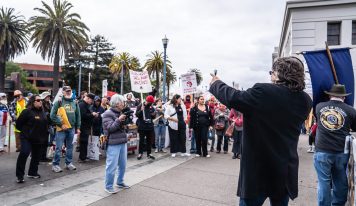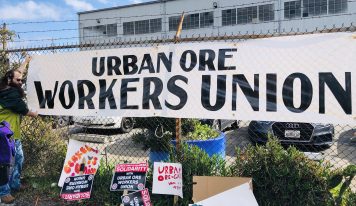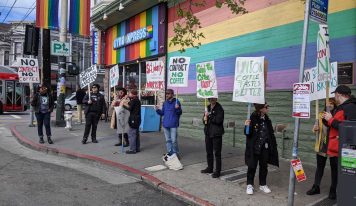San Francisco — This year’s California state senate race comes against the backdrop of unprecedented wildfires, over 225,000 deaths nationwide from COVID-19, and a continuing escalation shuttered businesses and eviction crises across the Bay Area. As the United States continues to lurch forward through a seemingly endless line of historic calamities, more and more voters are rethinking their satisfaction with the status quo and political leadership.
Jackie Fielder is counting on just that.
The 25 year-old Native American Democratic Socialist is challenging incumbent state senator Scott Wiener from the left, citing his failures to pass meaningful legislation and his campaign consistently taking funds from special interest groups that run counter to his rhetoric. Contributions to Weiner’s campaign this year through October 17 total more than $1.2 million. Since 2015, Wiener has received $800k from real estate interests, and counts Uber, Lyft, Facebook, Airbnb, PG&E, Chevron, and several billionaires among his campaign donors.
Conversely, Fielder is running an entirely grassroots campaign, refusing contributions from real estate and police lobbying groups. She has been unapologetically progressive in her platforms, which include touting a $100 billion state housing fund paid for by tax increases on the wealthy, a just transition to a zero-carbon economy by 2030, addressing income inequality, and divesting from law enforcement in favor of actual community and social services.
Her platform is resonating. Through October 17 of this year her campaign has raised more than $615,000, but noticeably raising $215,000 between February and June against Wiener’s $265,000 during this same period. Fielder also relies on small-dollar individual donors; 1,200 of Fielder’s 1,800 unique donors gave less than $100. Only two of her donations from this period came from organizations or PACs — $1,000 from the San Francisco Teachers Union, which has endorsed her, and $1,500 from the Three Affiliated Tribes, which is her tribe. She is enjoying endorsements from multiple progressive groups, including Our Revolution, the California Progressive Alliance and the Democratic Socialists of America. Locally, she has the backing of the California Teachers Association, the San Francisco Tenants Union, San Francisco Supervisors Gordon Mar, Dean Preston, Hillary Ronen and Matt Haney, along with Mark Sanchez, president of the San Francisco Board of Education. She also raised more than $58,000 in September during a social media blitz to maximize contributions under a filing deadline.
Her appeal to many voters is based on her personal history of activism. Fielder was raised in Southern California by a single mother in an underserved neighborhood, but fought her way out and through Stanford University, earning a BA in Public Policy and MA in Sociology. In 2016, she traveled to North Dakota to stand in solidarity with her indigenous relatives and allies against the Dakota Access Pipeline. She and others were violently suppressed with chemical weapons, police dogs, and other tactics that are now all too familiar for anyone watching or participating in the protests against police brutality this summer.
“Right now, one of our biggest donor bases is the underemployed and those who have been hit hardest by the pandemic, because they see a champion in Jackie,” said Daniel Anderson, Fielder’s Campaign Finance Director. “We are seeing major backing from educators and school organizers because of Jackie’s background as an educator.”
In an interview last week with the San Francisco Chronicle, Fielder noted Wiener’s support for charter schools, tax credits for real estate developers, and the lack of progress for appropriate housing measures to meet San Francisco needs. She also drew sharp contrasts between her approach to homelessness, noting Wiener’s opposition to Proposition C when it was on the 2018 ballot, a tax initiative aimed at raising $300 million towards homeless and housing services. Fielder notes that private investment is the major gatekeeper for housing solutions in the Bay, tying back to her roots as an organizer and co-founder of the San Francisco Public Bank Coalition.
“I’m of the belief that the private market has never been able to meet – especially here in San Francisco – our demand for affordable housing, specifically for working people,” Fielder told SF Chronicle Opinion editor John Diaz and his panel during her interview. “If we want to solve the inefficiencies in our housing allocations, we have to be sure our public resources are directly targeted to need and not for profit.”
“Looking at the filings and who is giving there is a clear working class divide between our donors. Jackie is so inspiring to people who have not met her or do not have a connection to her otherwise because of her story and who she is,” Anderson added. “We are trying to uncomplicate this race as much as possible and engage on a personal level.”
Regardless of the election outcome, Fielder has demonstrated Wiener’s vulnerabilities and that of other Democratic incumbents: Accountability for progressive promises will come calling, and there is a vast appetite in San Francisco for representation of the working class. As a progressive candidate raised by a single mother in an underserved neighborhood, Fielder understands the consequences and indifference of the status quo. Like many of the young progressive generation, she is running because of her disappointment in the business as usual approach in Sacramento. Her presence would be a challenge to the incrementalism that has allowed so many to go unhoused, over-policed, and institutionally shunned. This would undoubtedly be an unwelcome change for some of her future colleagues, but a welcome one for her constituents.





